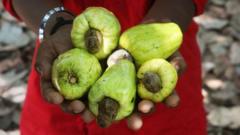Rising from being the third-largest exporter of unprocessed cashews, Ghana aims to maximize its profits through enhanced processing capabilities, but grapples with infrastructural and financial hurdles.
Ghana's Cashew Challenge: Breaking the Shell of Global Market Constraints

Ghana's Cashew Challenge: Breaking the Shell of Global Market Constraints
Ghana seeks to increase its cashew exports by improving local processing despite challenges like high interest rates and global competition.
Ghana is well-known for producing high-quality cashew nuts, ranking as the world's third-largest exporter of unprocessed varieties, trailing behind Ivory Coast and Cambodia. However, the nation struggles to retain more profit from its staple crop, as over 80% of its output is shipped abroad in raw form, missing the higher margins associated with processed cashew products. A visit to a vendor in Accra reveals that the price of roasted cashews is astronomical compared to what farmers earn for the unshelled varieties, prompting concerns about economic sustainability within the industry.
Nashiru Seydou, a local farmer, expresses frustration over the unpredictable market dynamics, which affect livelihoods for many families reliant on cashew production. Seydou, whose family operates a farm in the northeast, noted that he earns a meager $50 for a 100 kg sack of unshelled nuts — a stark contrast to the up to $40,000 a ton that roasters can charge for ready-to-eat cashews. Local entrepreneurs like Mildred Akotia, CEO of Akwaaba Fine Foods, are attempting to change this narrative by pushing for greater local processing; however, the challenge of securing affordable credit hampers their efforts to scale operations.
The high-interest rates on loans, which can reach 30%, deter many prospective manufacturers from entering the market, leaving Ghana reliant on foreign processors. Akotia emphasizes that African entrepreneurs need more support, and the government must enhance infrastructure to make cashew processing viable at home. Despite past attempts at export bans and increased tariffs designed to boost local processing, the resultant fluctuations left many farmers with rotting nuts and decimated profits.
Experts like Bright Simons argue that understanding business fundamentals is crucial for fostering a local market that increases domestic demand for processed cashews. Similarly, Nobel laureate Prof. Daron Acemoglu stresses the importance of improving access to international markets for Ghana's processed products while building local capacity. The aspirations of entrepreneurs like Akotia reflect a growing ambition to transform the industry; she hopes to not only satisfy increasing international demands but also foster a homegrown consuming market.
As Ghana navigates these complex challenges, it must balance improving local economic conditions and cultivating an environment where its agricultural products command respect and profitability in the global arena.
Nashiru Seydou, a local farmer, expresses frustration over the unpredictable market dynamics, which affect livelihoods for many families reliant on cashew production. Seydou, whose family operates a farm in the northeast, noted that he earns a meager $50 for a 100 kg sack of unshelled nuts — a stark contrast to the up to $40,000 a ton that roasters can charge for ready-to-eat cashews. Local entrepreneurs like Mildred Akotia, CEO of Akwaaba Fine Foods, are attempting to change this narrative by pushing for greater local processing; however, the challenge of securing affordable credit hampers their efforts to scale operations.
The high-interest rates on loans, which can reach 30%, deter many prospective manufacturers from entering the market, leaving Ghana reliant on foreign processors. Akotia emphasizes that African entrepreneurs need more support, and the government must enhance infrastructure to make cashew processing viable at home. Despite past attempts at export bans and increased tariffs designed to boost local processing, the resultant fluctuations left many farmers with rotting nuts and decimated profits.
Experts like Bright Simons argue that understanding business fundamentals is crucial for fostering a local market that increases domestic demand for processed cashews. Similarly, Nobel laureate Prof. Daron Acemoglu stresses the importance of improving access to international markets for Ghana's processed products while building local capacity. The aspirations of entrepreneurs like Akotia reflect a growing ambition to transform the industry; she hopes to not only satisfy increasing international demands but also foster a homegrown consuming market.
As Ghana navigates these complex challenges, it must balance improving local economic conditions and cultivating an environment where its agricultural products command respect and profitability in the global arena.





















